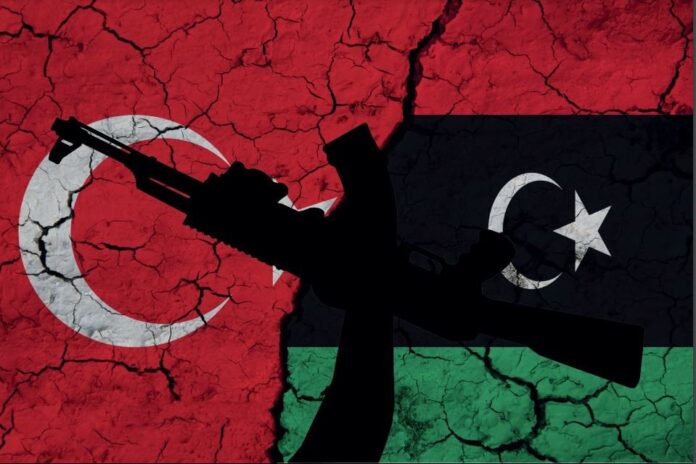Author: Murat Aslan
Affiliation: Foundation for Political, Economic and Social Research (SETA); İstanbul Sabahattin Zaim University
Organization/Publisher: Foundation for Political, Economic and Social Research (SETA)
Date/Place: May 2021/Ankara, Turkey
Type of Literature: Analysis
Number of Pages: 16
Link: https://www.setav.org/en/analysis-libyas-future-with-or-without-a-turkish-military-presence/
Keywords: Turkey, Libya, Military Presence, Foreign Actors, Political Process
Brief
Murat Aslan analyzes developments in Libya and the causes behind the prevailing risks. He examines the agendas of the foreign actors involved in the Libyan scene and their pledges to maintain its political and security environment. Aslan highlights that the Turkish military presence is an opportunity to Libya and its allies. The analysis underlines four critical areas of interest to Western states: foreign military presence and the mercenaries, illegal immigrants, management of the political process, and business opportunities. Aslan introduces external actors ’interests in Libya and how they have shaped their strategies. Although the US has claimed neutrality, its policy has been based on filling the gap of the US military absence on ground by maintaining dynamic diplomatic efforts as well as imposing figures on the Libyan political scene. While France denies any involvement in the Libyan conflict, it has been providing direct support to Haftar and his militia. Although the political process has compelled France to meet the Berlin Conference, it still keeps watching Haftar for any failure of the political process that would require French strategy reconsideration in Libya. Italy has followed a multiple-facet strategy encompassing playing a mediating role, emphasizing its relations with Tripoli, while contacting Haftar with a low-level delegation. Its focus has been business opportunities and competing with other actors by intensifying its diplomatic relations with the Government of National Unity (GNU). Due to their involvement in other critical issues, Greece and the UK have played a limited role in the Libyan scene. On the other hand, the UAE is extremely involved in the Libyan conflict through financing pro-Haftar mercenaries, particularly the Russian private military company ‘Wagner’. Aslan considers Russia’s strategy as the smartest since its military is involved while funded by the UAE. Moreover, it could not be held accountable for any military intervention since Wagner is a private company. In addition, Russia sells a huge number of arms and military equipment to Haftar’s militia. On the other side, only Turkey and Qatar have supported the legitimate Tripoli government. Turkey’s military presence and support to the GNU has challenged all other actors ’calculations. In addition, it has facilitated the political process in Libya as well as develop an advance of western-armed groups against Haftar that achieve a balance between the two fronts. Due to all of that, the fragility of the security environment is a result of both local dynamics and these projections of external actors. Apart from the political process, business opportunities and infrastructure projects have become another area of competition between Western states. Another critical point to the Western states is that if the political process fails and Haftar decides to attack Tripoli, it would mean a refugee flow to European countries. Regarding the Turkish role in Libya, Aslan emphasizes the significance of the Turkish military intervention to support the GNU which has been the last chance for the GNU and Libyans living in the northwest of Libya since it has helped in the organization of the western armed groups and pushed for their dedication to achieve the goals of the Tripoli government. Moreover, Turkish presence is the guarantee to the efficient control of these armed groups. Apart from local dynamics, Turkish military presence maintains a balance with the Russian military and other mercenaries ’presence on the Libyan grounds to sustain the GNU against Haftar’s self-styled militia. Although the Western states show support to the political process, they are not providing or ready to provide any military protection to either the political process or the GNU. They are only accorded to defect the Russian and Turkish military presence while keeping silent on the UAE military intervention in Libya. The security being provided by the Turkish presence has facilitated the initiation of infrastructure projects in the northwest. Aslan concludes that Libya is still fragile and the presence of Haftar and other mercenaries threaten the GNU. However, Turkey is the only ‘balancing actor ’that is capable to protect Tripoli and the public. He recommends that other countries could cooperate with Turkey to support the GNU. He adds that the Turkish role should include ‘training, educating, coordinating and mentoring mission ’to build efficient Libyan security forces.
Critical Analysis:
The author’s arguments about the merits of the Turkish military presence in Libya, which he considers as an opportunity for both external actors and the Libyan public, have not been properly illustrated and need more elaboration to credibly establish his argument. Nevertheless, the premise he adopts should be seriously considered since Turkey’s military presence is the only balancing factor among all the other external military interferences on the Libyan ground including the Russian and the financing and supporting efforts of the UAE and others. If this has not been taken into consideration, the military equation would directly favor Haftar’s control on the ground.
By: Yomna Süleyman, CIGA Research Assistant




